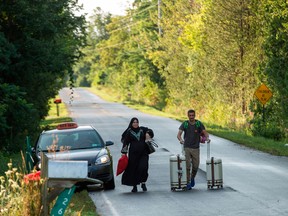Some illegal border crossers receive $224 in food and accommodation per day while awaiting processing
[Look at these figures: 42,386 illegals are each collecting $224 per day for food and lodging courtesy of the Canadian taxpayer as they await adjudication of their queue jumping “refugee” claim. ““The NDP-Liberal government is giving TEN TIMES the benefits to illegal border jumpers than it is giving to help Canadian seniors! DISGRACEFUL!” says Conservative MP Lianne Rood. For 30 years, Canada First has advocated that NO ONE should be allowed to show up in Canada and claim refugee status while feasting off the Canadian taxpayer. All immigration and refugee applications should be made to Canadian embassies and consulates and vetted abroad. If and ONLY if they qualify, should the applicants be admitted to Canada. — Paul Fromm, Director]
At the end of 2023, Immigration, Refugees and Citizenship Canada recorded 42,387 pending refugee claims by irregular border crossers
Published May 13, 2024 • 3 minute read
587 Comments

Article content
As the number of Canada’s refugee claimants hits new highs, a Conservative MP has revealed that Ottawa budgets about $224 per day to feed and house some foreigners who claim asylum after illegally entering the country.
Last week, Conservative MP Lianne Rood uploaded documents to social media showing the government’s answer to her question about what “goods and services” are provided to foreigners who have claimed asylum in Canada — but have not yet had their applications reviewed by immigration authorities.
The average accommodation cost is “$140 per night per room,” and the average cost for meals is “$84 per day per claimant” — for a total of $224 per claimant, per day.
And the per diem cost may go even higher once factoring in the other “essential items” provided for free to claimants, including “toiletries, medicines, diapers.”
“Claimants in IRCC operated hotels, regardless of how they entered Canada, are provided with accommodations and meals once they are relocated,” read the official answer to Rood, signed by Paul Chiang, parliamentary secretary to the minister of diversity and inclusion.
“The NDP-Liberal government is giving TEN TIMES the benefits to illegal border jumpers than it is giving to help Canadian seniors! DISGRACEFUL!” wrote Rood in an accompanying caption to a May 7 post on X uploading the document.
As of the most recent figures by the IRCC, there are 156,032 pending asylum claims before the agency — although not all of them are in Canada and living within an IRCC hotel.
With many asylum seekers overwhelming municipally run shelters, the Trudeau government recently began the Interim Housing Assistance Program to “provide limited temporary accommodations for claimants who otherwise would not have a place to shelter.”
In November the program operated 3,800 rooms across Canada, housing approximately 7,000 claimants at a total annual cost of $557 million.
Rood’s question had been in regards to a specific category of asylum seeker referred to in federal circles as “irregular border crossers.” This is someone who entered Canada illegally before making an inland asylum claim. In official IRCC parlance, an irregular border crosser entered Canada “between official ports of entry.”
And in that category, pending claims are at historic highs. At the end of 2023, the IRCC recorded 42,387 pending refugee claims by irregular border crossers.
In just the last three months of 2023, 2,145 people made an asylum claim in Canada after illegally entering the country — an average of one every hour.
In that same three-month period, authorities would only process 4,139 cases out of a pre-existing queue of 44,000; 3,188 of which were accepted as official refugees, with the other 951 either rejected, withdrawn or abandoned.
The intake has stayed high despite the fact that the Trudeau government closed the infamous Roxham Road border crossing in March 2023.
Article content
For six years, the rural Quebec location had been a conduit for more than 100,000 illegal border crossers. On the southern side, U.S. bus companies ran dedicated services for foreigners seeking to enter Canada and claim asylum. On the northern side, the RCMP spent millions to erect semi-permanent structures to process the influx.
Although Canada could have unilaterally closed the Roxham Road crossing at any time (as it did for several months during the COVID-19 pandemic), the Trudeau government waited until the U.S. had approved a minor modification to the Safe Third Country Agreement to start turning away irregular border crossers.
Regardless, 8,131 irregular border crossers entered Canada in the immediate three months after the Roxham Road closure — a rate higher than almost any point in the six years when the crossing was open.
Since the federal government first started keeping tabs on irregular border crossers in early 2017, 39,643 have been approved as official refugees to 22,611 who have been rejected — a ratio of roughly one rejected claimant for every two who had their case approved by IRCC.


